新教材高一英语UNIT5教案_1
- 格式:docx
- 大小:20.09 KB
- 文档页数:10
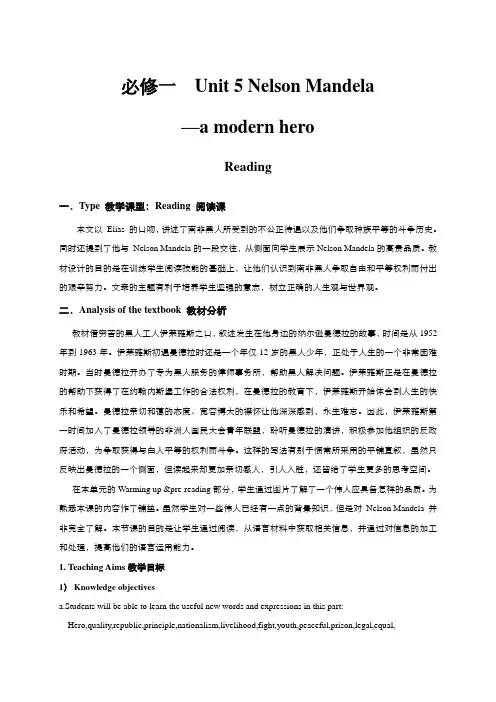
必修一Unit 5 Nelson Mandela—a modern heroReading一.Type 教学课型:Reading 阅读课本文以Elias 的口吻,讲述了南非黑人所受到的不公正待遇以及他们争取种族平等的斗争历史。
同时还提到了他与Nelson Mandela的一段交往,从侧面向学生展示Nelson Mandela的高贵品质。
教材设计的目的是在训练学生阅读技能的基础上,让他们认识到南非黑人争取自由和平等权利而付出的艰辛努力。
文章的主题有利于培养学生坚强的意志,树立正确的人生观与世界观。
二.Analysis of the textbook 教材分析教材借穷苦的黑人工人伊莱雅斯之口,叙述发生在他身边的纳尔逊曼德拉的故事,时间是从1952年到1963年。
伊莱雅斯初遇曼德拉时还是一个年仅12岁的黑人少年,正处于人生的一个非常困难时期。
当时曼德拉开办了专为黑人服务的侓师事务所,帮助黑人解决问题。
伊莱雅斯正是在曼德拉的帮助下获得了在约翰内斯堡工作的合法权利,在曼德拉的教育下,伊莱雅斯开始体会到人生的快乐和希望。
曼德拉亲切和蔼的态度、宽容博大的襟怀让他深深感到,永生难忘。
因此,伊莱雅斯第一时间加入了曼德拉领导的非洲人国民大会青年联盟,聆听曼德拉的演讲,积极参加他组织的反政府活动,为争取获得与白人平等的权利而斗争。
这样的写法有别于惯常所采用的平铺直叙,虽然只反映出曼德拉的一个侧面,但读起来却更加亲切感人,引人入胜,还留给了学生更多的思考空间。
在本单元的Warming up &pre-reading部分,学生通过图片了解了一个伟人应具备怎样的品质。
为熟悉本课的内容作了铺垫。
虽然学生对一些伟人已经有一点的背景知识,但是对Nelson Mandela 并非完全了解。
本节课的目的是让学生通过阅读,从语言材料中获取相关信息,并通过对信息的加工和处理,提高他们的语言运用能力。
1. Teaching Aims教学目标1)Knowledge objectivesa.Students will be able to learn the useful new words and expressions in this part:Hero,quality,republic,principle,nationalism,livelihood,fight,youth,peaceful,prison,legal,equal,law,advise,continue,gold,passbook,ANC,league,stage,vote,position,accept,violence,devote,vote, guidance, blow up, in troubleb. Enable the students to read Elias’ storyc. Guide the students to know the qualities of Nelson Mandela as a great leader2) Ability objectivesa.Develop the students ’reading skills, such as fast reading ,careful reading and summarizingb.Improve the students’ comprehension ability3) Emotion objectivesa,Understand the qualities great person have in common and learn the fine qualities from themb.Develop the students’ moral quality2.Teaching important points教学重点a.Enable the students to read Elias’ story and Learn to grasp the main idea of the text.b.Enable students to talk about the fine qualities of great people,especially Nelson Mandelac.Improve the students’ reading ability3.Teaching difficult points 教学难点a.How to grasp the main idea of the text.b.How to help develop students’ reading abilityc.How to help students learn from Nelson Mandela4.Teaching methods 教学方法a.Student-centeredb.Task-based teaching method(任务型教学)c.Discussion5.Learning methods 学习方法Individual or pair work and group work6.Teaching Aids 教具准备The multimedia三.教学设计1. 总体思路本堂课的主要内容分为四大部分,Pre-reading(阅读前活动) ,while –reading(阅读中活动),post-reading(阅读后活动)以及discussion(讨论) and role play 。
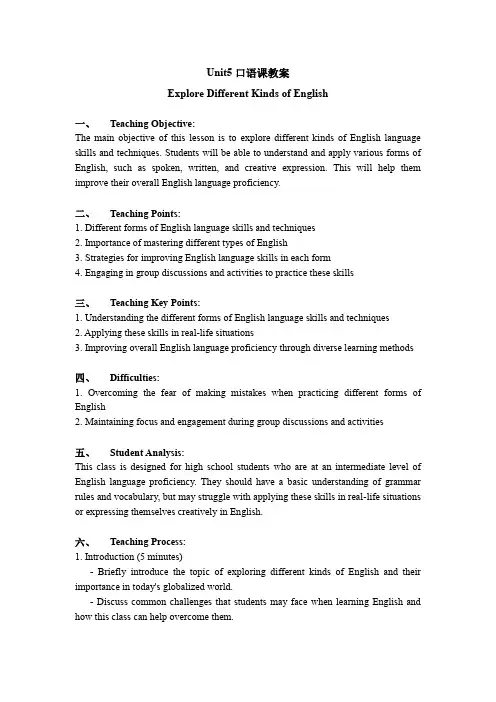
Unit5口语课教案Explore Different Kinds of English一、Teaching Objective:The main objective of this lesson is to explore different kinds of English language skills and techniques. Students will be able to understand and apply various forms of English, such as spoken, written, and creative expression. This will help them improve their overall English language proficiency.二、Teaching Points:1. Different forms of English language skills and techniques2. Importance of mastering different types of English3. Strategies for improving English language skills in each form4. Engaging in group discussions and activities to practice these skills三、Teaching Key Points:1. Understanding the different forms of English language skills and techniques2. Applying these skills in real-life situations3. Improving overall English language proficiency through diverse learning methods四、Difficulties:1. Overcoming the fear of making mistakes when practicing different forms of English2. Maintaining focus and engagement during group discussions and activities五、Student Analysis:This class is designed for high school students who are at an intermediate level of English language proficiency. They should have a basic understanding of grammar rules and vocabulary, but may struggle with applying these skills in real-life situations or expressing themselves creatively in English.六、Teaching Process:1. Introduction (5 minutes)-Briefly introduce the topic of exploring different kinds of English and their importance in today's globalized world.- Discuss common challenges that students may face when learning English and how this class can help overcome them.2. Formative Assessment (10 minutes)-Have students work in pairs to discuss their favorite ways to practice English (e.g., reading, writing, listening, speaking) and why they enjoy these activities.-Encourage students to share examples of how they have used English in their daily lives.3. Learning Objectives (15 minutes)-Introduce the different forms of English language skills and techniques (e.g., spoken, written, creative expression).-Discuss the benefits of mastering each form and how it can improve overall English language proficiency.- Provide examples of each form and discuss strategies for improving each skill.4. Application (20 minutes)-Break students into small groups and assign each group a specific form of English language skill or technique to explore (e.g., poetry writing, storytelling, debate).- Have students engage in group discussions and activities related to their assigned skill, using a variety of resources (e.g., books, articles, videos).- Encourage students to share their findings with the class and provide feedback on each other's work.5. Closing (5 minutes)- Review the key points covered in the lesson and emphasize the importance of practicing different forms of English in order to improve overall proficiency.- Ask students to reflect on what they learned in this lesson and what they plan to do differently moving forward to improve their English language skills.七、Homework:1. Write a reflection paper on the different forms of English language skills and techniques covered in the lesson. Discuss how you can apply these skills in your own life to improve your overall English language proficiency.2. Practice a new form of English language skill or technique outside of school by setting aside time each day to engage in the activity (e.g., reading a book in English, watching a movie without subtitles, joining an online forum to practice writing).3. Share your progress with your teacher or classmates by presenting your reflection paper or sharing your experiences practicing a new form of English language skill or technique.。
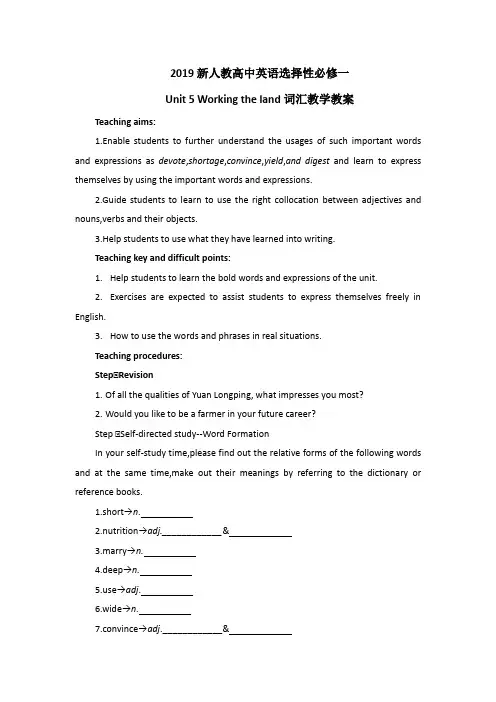
2019新人教高中英语选择性必修一Unit 5 Working the land词汇教学教案Teaching aims:1.Enable students to further understand the usages of such important words and expressions as devote,shortage,convince,yield,and digest and learn to express themselves by using the important words and expressions.2.Guide students to learn to use the right collocation between adjectives and nouns,verbs and their objects.3.Help students to use what they have learned into writing.Teaching key and difficult points:1.Help students to learn the bold words and expressions of the unit.2.Exercises are expected to assist students to express themselves freely in English.3.How to use the words and phrases in real situations.Teaching procedures:StepⅠRevision1.Of all the qualities of Yuan Longping, what impresses you most?2.Would you like to be a farmer in your future career?Step ⅡSelf-directed study--Word FormationIn your self-study time,please find out the relative forms of the following words and at the same time,make out their meanings by referring to the dictionary or reference books.1.short→n.2.nutrition→adj.____________&3.marry→n.4.deep→n.e→adj.6.wide→n.7.convince→adj.____________&8.warm→n.9.convention→adj.10.grow→n.11.assume→n.12.dead→n.13.consume→n.14.long→n.15.secure→n.16.strong→n.17.salt→adj.18.entire→adv.19.cloud→adj.20.poor→n.21.sun→adj.22.safe→n.23.fog→adj.24.extend→n.Suggested answers:1.shortage2.nutritional;nutritious3.marriage4.deptheful6.width7.convincing; convinced8.warmth9.conventional10.growth11.assumption 12.death13.consumption14.length15.security16.strength17.salty 18.entirely19.cloudy20.poverty21.sunny22.safety23.foggy 24.extensionStepⅠ Collocations1.my lifelong pursuit我毕生的追求2.enormous difficulty巨大的困难3.work the land耕种土地4.rice consumption水稻消费量5.pursue a career 追求事业6.invaluable contribution宝贵的贡献7. a poor harvest收成不好8. a life of leisure一种悠闲的生活9.have a shortage of缺少……10.make a large donation捐献了很多11.tackle the crisis解决危机12.fulfil one’s dream实现某人的梦想13.boost yields增加产量14.at home and abroad在国内外15.attain a higher yield获得高产量16.advanced years高龄17.intense effort大量的努力18.serve the high demand for sth满足很高的需求【词汇运用】1.I believe that I have come this far because of my willpower.I am never tired of working,as acting has been my pursuit.I feel honoured to receive so much love from the people of this country.2.The president is clearly in a dilemma about how to the crisis.3.Schools nationwide are experiencing a of teachers.4.She felt that she had failed to her objectives for the year.5.During his years,he was still devoted to carving.Suggested answers:1.lifelong2.tackle3.shortage4.fulfil5.advancedStepⅠ Usages of important words and phrasesIn the following part, we’ll study the usages of the words or phrases.(红色为学生作答部分)1.devote vt.把……献(给);把……专用于;专心于【教材回顾】Indeed,his slim but strong body is just like that of millions of Chinese farmers,to whom he has devoted his life.【同义句替换】Indeed,he is just like one of the millions of Chinese farmers with a slim but strong body.And he has given most of his life to them.【语境感知】She devoted herself to her career.她全心全意投入到她的工作中。
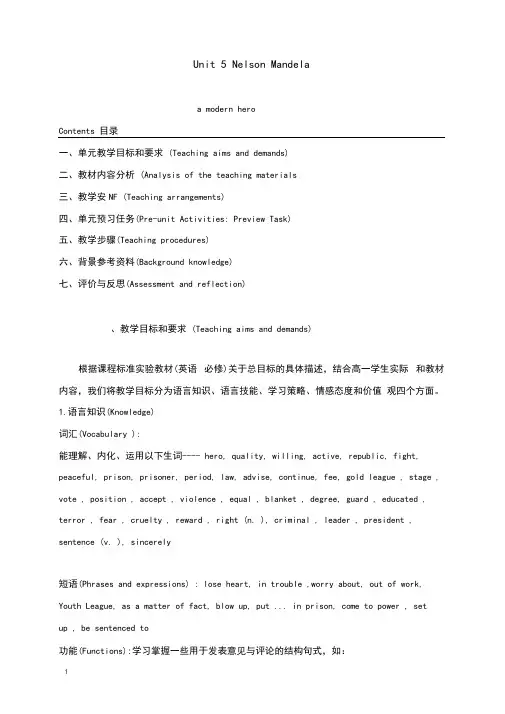
Unit 5 Nelson Mandelaa modern heroContents 目录一、单元教学目标和要求(Teaching aims and demands)二、教材内容分析 (Analysis of the teaching materials三、教学安NF (Teaching arrangements)四、单元预习任务(Pre-unit Activities: Preview Task)五、教学步骤(Teaching procedures)六、背景参考资料(Background knowledge)七、评价与反思(Assessment and reflection)、教学目标和要求(Teaching aims and demands)根据课程标准实验教材(英语必修)关于总目标的具体描述,结合高一学生实际和教材内容,我们将教学目标分为语言知识、语言技能、学习策略、情感态度和价值观四个方面。
1.语言知识(Knowledge)词汇(Vocabulary ):能理解、内化、运用以下生词---- hero, quality, willing, active, republic, fight, peaceful, prison, prisoner, period, law, advise, continue, fee, gold league , stage , vote , position , accept , violence , equal , blanket , degree, guard , educated , terror , fear , cruelty , reward , right (n. ), criminal , leader , president , sentence (v. ), sincerely短语(Phrases and expressions) : lose heart, in trouble ,worry about, out of work, Youth League, as a matter of fact, blow up, put ... in prison, come to power , setup , be sentenced to功能(Functions):学习掌握一些用于发表意见与评论的结构句式,如:1. 发表意见(Giving opinions )Why do you think so? What do you think of …? What's you opinion?agree / don't agree. I think / don't think .... I prefer .... In myopinion ....I'm afraid ....2.评论(Making comments)Good idea! That's an excellent idea .语法(Grammar):定语从句(II )(由where, when, why, 介词+ which, 介词+ whom引导的定语从句)The school where I studied only two years was three kilometres awayThis was a time when you had got to have a passbook to live in JohannesburgThe reason why I got a job was because of my hard work .•••we were put in a position in which we had either to accept we were less important, or fight the Government .The person to whomyou should be grateful for a peaceful South Africa is Nelson Mandela.扩展词汇:negative(消极的),heroine(女主角,女主人公),unwilling(不情愿的),nation(国家,民族),sacrifice(牺牲),realize (认识到),give up (放弃),riches (财富),Bible (圣经),revolution (革命),career (职业),equality (平等),fairness(公平),conflict (冲突),biography (自传),beliefs (信仰),Christianity (基督教),religion (宗教),priests (牧师),version (翻译),readable (易读的),adventure (冒险),scholar (学者),sympathy (同情),,campaign (从事活动),communist (共产主义者),injustice (不公平),oppose (反对),pilot(飞行员) , boycott (联合抵制)2.语言技能(Skills)听:在本单元的课文及练习册听力教学中,能听懂人物和事件以及它们的关系,能抓住所听语段中的关键词,正确理解话语间的逻辑关系。
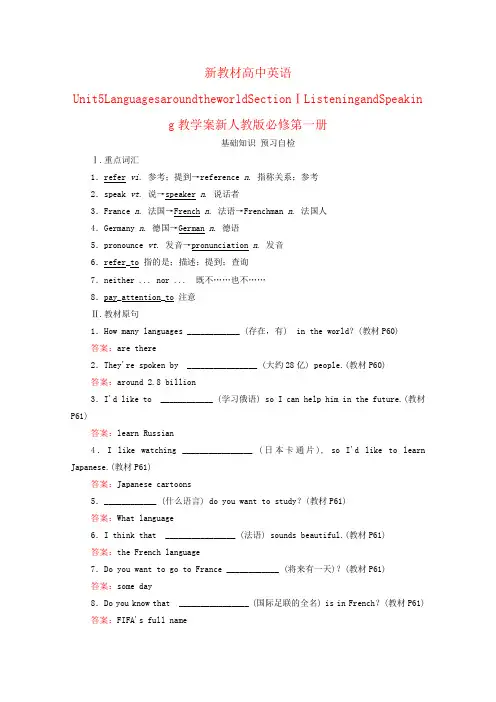
新教材高中英语Unit5LanguagesaroundtheworldSectionⅠListeningandSpeaking教学案新人教版必修第一册基础知识预习自检Ⅰ.重点词汇1.refer vi. 参考;提到→reference n. 指称关系;参考2.speak vt. 说→speaker n. 说话者3.France n. 法国→French n. 法语→Frenchman n. 法国人4.Germany n. 德国→German n. 德语5.pronounce vt. 发音→pronunciation n. 发音6.refer_to 指的是;描述;提到;查询7.neither ... nor ... 既不……也不……8.pay_attention_to 注意Ⅱ.教材原句1.How many languages ____________ (存在,有) in the world?(教材P60)答案:are there2.They're spoken by ________________ (大约28亿) people.(教材P60)答案:around 2.8 billion3.I'd like to ____________ (学习俄语) so I can help him in the future.(教材P61)答案:learn Russian4.I like watching ________________ (日本卡通片), so I'd like to learn Japanese.(教材P61)答案:Japanese cartoons5.____________ (什么语言) do you want to study?(教材P61)答案:What language6.I think that ________________ (法语) sounds beautiful.(教材P61)答案:the French language7.Do you want to go to France ____________ (将来有一天)?(教材P61)答案:some day8.Do you know that ________________ (国际足联的全名) is in French?(教材P61) 答案:FIFA's full name9.There is no egg in eggplant nor ham in hamburger: ________________ (既不是苹果也不是) pine in pineapple.(教材P61)答案:neither apple nor10.English muffins ________________ (没有被发明) in England or French fries in France.(教材P61)答案:weren't invented重点知识合作探究①(2018·全国卷Ⅲ) ... which is often referred_to_as the Nobel Prize in architecture ...……通常被称为诺贝尔建筑奖……②If you don't understand some words, you can refer_to the dictionary.如果你不懂一些单词,你可以查阅字典。
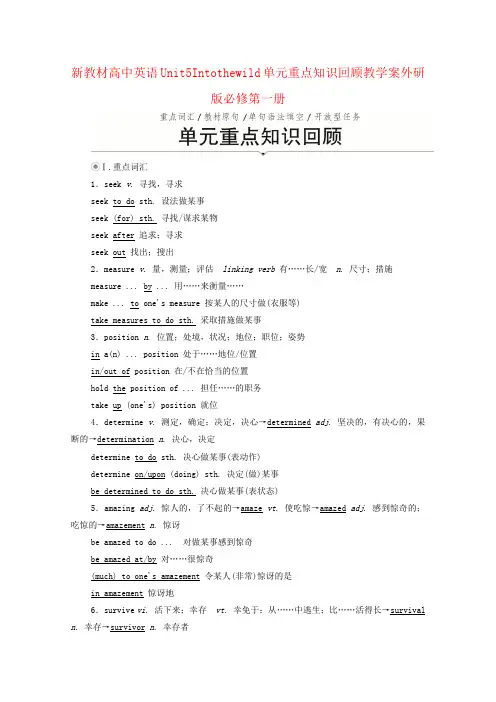
新教材高中英语Unit5Intothewild单元重点知识回顾教学案外研版必修第一册Ⅰ.重点词汇1.seek v. 寻找,寻求seek to do sth. 设法做某事seek (for) sth. 寻找/谋求某物seek after 追求;寻求seek out 找出;搜出2.measure v. 量,测量;评估linking verb有……长/宽n. 尺寸;措施measure ... by ... 用……来衡量……make ... to one's measure 按某人的尺寸做(衣服等)take measures to do sth. 采取措施做某事3.position n. 位置;处境,状况;地位;职位;姿势in a(n) ... position 处于……地位/位置in/out of position 在/不在恰当的位置hold the position of ... 担任……的职务take up (one's) position 就位4.determine v. 测定,确定;决定,决心→determined adj. 坚决的,有决心的,果断的→determination n. 决心,决定determine to do sth. 决心做某事(表动作)determine on/upon (doing) sth. 决定(做)某事be determined to do sth. 决心做某事(表状态)5.amazing adj. 惊人的,了不起的→amaze vt. 使吃惊→amazed adj. 感到惊奇的;吃惊的→amazement n. 惊讶be amazed to do ... 对做某事感到惊奇be amazed at/by 对……很惊奇(much) to one's amazement 令某人(非常)惊讶的是in amazement 惊讶地6.survive vi. 活下来;幸存vt. 幸免于;从……中逃生;比……活得长→survival n. 幸存→survivor n. 幸存者survive sth. 幸免于……,从……中艰难度过survive sb. (by three years) 比……活得长(三年)7.effect n. 影响,结果→effective adj. 有效的→effectively adv. 有效地have an effect on/upon ... 对……有影响bring/put ... into effect 使生效;实行,实施come into effect 生效,开始实施in effect 有效;在实施中;实际上8.accommodation n. 住处,工作场所;食宿;膳食供应→accommodate vt. 容纳(乘客);向……提供膳宿;使适应,顺应make/provide accommodations for 为……提供食宿accommodate sb. with sth. 给……提供……accommodate ... to ... =adapt ... to ... 使……适应/迎合……(其中to为介词) accommodate oneself to 使自己适应……accommodate sb. for the night 留某人过夜9.variety n. [C]种类,品种 [U]变化,多样性→vary v. (使)变化,不同→various adj. 各种各样的→variation n. 变化a variety of=varieties of 各种各样的vary from ... to ... 从……到……不同vary with ... 随……而变化10.concentrate v. 集中(注意力、思想等)→concentration n. 专心,集中concentrate ... on/upon ... 把……专注于……concentrate on/upon ... 专注于……11.cut down 砍倒;削减,缩小(尺寸、数量等);降价cut off 切断;停掉;隔绝cut in 插嘴;插队cut across/through 抄近路穿过12.after all 毕竟,归根结底;终究in all 总共above all 尤其是,最重要的是(强调重要性)all the time 始终,一直all of a sudden=suddenly 突然,冷不防地Ⅱ.教材原句1.Somehow they manage to travel around 4,000 kilometres south and find their way to California or Mexico. (P50)不知怎么地,它们成功地向南行进了4,000公里,到达了加利福尼亚或墨西哥。


高一英语必修一unit5教案高一英语必修一unit5教案1(一) 教材地位和教学内容分析本课是高一必修模块1第4单元的阅读课型,这单元围绕earthquakes这一主题开展听、说、读、写多种教学活动。
Reading设计为本单元的第2课时。
本课型是单元整体教学的重要环节,为学生的语言学习、语法学习提供了载体,并且是学生获取信息的主要来源。
“Reading―――A NIGHT THE EARTH DIDN’T SLEEP”具体描写1976年唐山大地震的震前、震中和震后。
本篇文章词汇量大,运用了大量的动词、复杂的数字,出现许多定语从句,篇幅较长,并且采用一些修辞手法,对学生的语言阅读能力提出了更高的要求。
但文章的结构较明显,较容易归纳出各部分的中心词。
(二)教学目标1. 语言知识目标:a)使学生了解自然灾害的相关词汇,并掌握复杂数字的表达法。
b)学习掌握与地震相关的词汇,如:shake,well,rise,smelly,pond,pipe,burst,canal,steam,ruin,injure,destro y,brick,dam,useless,steel,shock,quake,rescue,electricity,disaster,arm y,organize,bury,coal,mine,shelter,fresh,percent等,以及right away, at an end, dig out, give out, thousands of以及一些优美句子的赏析。
2. 语言技能目标:a)阅读技能的训练:让学生学会克服生词障碍,通过略读,归纳出文章的大意;通过细读,理清文章的总体框架与脉络,归纳出各部分的中心词;通过查读,捕捉文章的重要细节,培养学生获取、处理信息的能力。
b) 让学生复述课文,分析、感悟作者的写作意图。
c) 让学生运用本节课所学词汇、知识,通过采访唐山大地震幸存者的形式进行小组活动,提高学生用英语进行创造性交流的能力。
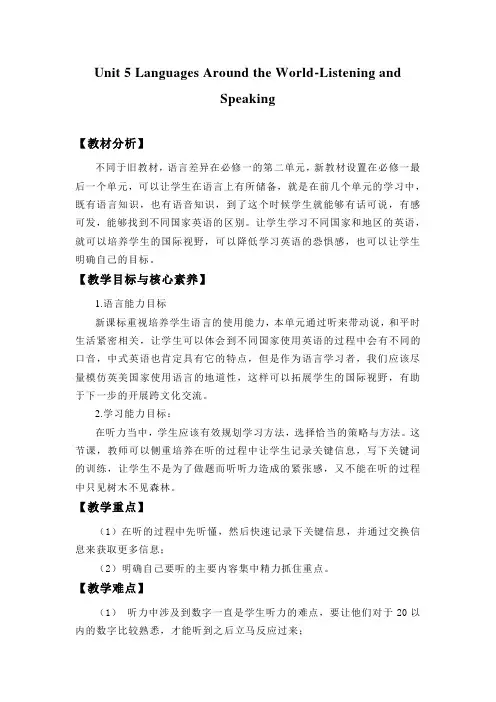
Unit 5 Languages Around the World-Listening andSpeaking【教材分析】不同于旧教材,语言差异在必修一的第二单元,新教材设置在必修一最后一个单元,可以让学生在语言上有所储备,就是在前几个单元的学习中,既有语言知识,也有语音知识,到了这个时候学生就能够有话可说,有感可发,能够找到不同国家英语的区别。
让学生学习不同国家和地区的英语,就可以培养学生的国际视野,可以降低学习英语的恐惧感,也可以让学生明确自己的目标。
【教学目标与核心素养】1.语言能力目标新课标重视培养学生语言的使用能力,本单元通过听来带动说,和平时生活紧密相关,让学生可以体会到不同国家使用英语的过程中会有不同的口音,中式英语也肯定具有它的特点,但是作为语言学习者,我们应该尽量模仿英美国家使用语言的地道性,这样可以拓展学生的国际视野,有助于下一步的开展跨文化交流。
2.学习能力目标:在听力当中,学生应该有效规划学习方法,选择恰当的策略与方法。
这节课,教师可以侧重培养在听的过程中让学生记录关键信息,写下关键词的训练,让学生不是为了做题而听听力造成的紧张感,又不能在听的过程中只见树木不见森林。
【教学重点】(1)在听的过程中先听懂,然后快速记录下关键信息,并通过交换信息来获取更多信息;(2)明确自己要听的主要内容集中精力抓住重点。
【教学难点】(1)听力中涉及到数字一直是学生听力的难点,要让他们对于20以内的数字比较熟悉,才能听到之后立马反应过来;Unit 5 Languages Around the World-Reading andThinking【教材分析】本节课是高中英语第一册的最后一个单元的阅读和思考部分,文章难度明显增加,体现在以下几个方面:文章题材是说明文,比较难理解;话题生疏,涉及到历史等知识;生词量增大,而且在语境中理解词汇的要求提高。
面对这些,教师的难度和高度也要有所提升,通过探讨说明顺序,了解背景知识等帮助他们找到说明文阅读的方法。
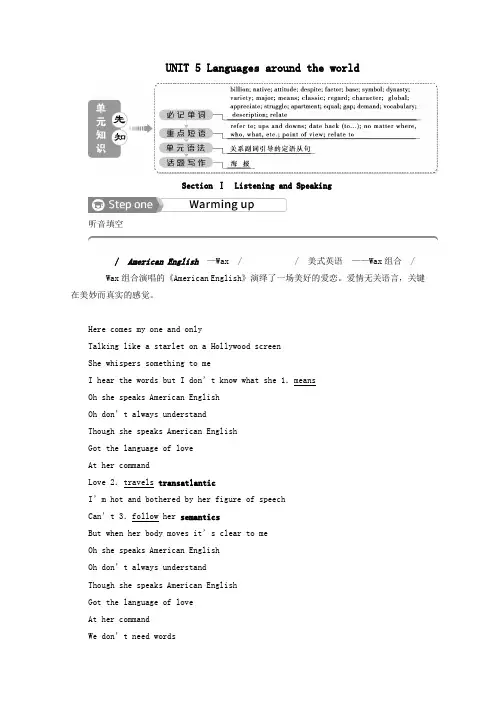
UNIT 5 Languages around the worldSection ⅠListening and Speaking听音填空/American English—Wax / / 美式英语——Wax组合/Wax组合演唱的《American English》演绎了一场美好的爱恋。
爱情无关语言,关键在美妙而真实的感觉。
Here comes my one and onlyTalking like a starlet on a Hollywood screenShe whispers something to meI hear the words but I don’t know what she 1.meansOh she speaks American EnglishOh don’t always understandThough she speaks American EnglishGot the language of loveAt her commandLove 2.travels transatlanticI’m hot and bothered by her figure of speechCan’t 3.follow her semanticsBut when her body m oves it’s clear to meOh she speaks American EnglishOh don’t always understandThough she speaks American EnglishGot the language of loveAt her commandWe don’t need wordsTo express 4.what is realWe’ve got each otherThat says everything that we feelThere’s too much damn confusionWith all this talking going round and round We’ll 5.reach our own conclusionWe’ll make connection on the common ground Oh she speaks American EnglishOh don’t always understandThough she speaks American EnglishGot the language of loveAt her command你是我的唯一说话像一个好莱坞屏幕上的明星她向我低语我听到这句话,但是我不知道她是什么意思哦,她说美式英语哦,总是不理解虽然她说美式英语爱的语言由她掌控爱跨大西洋我困惑于她的话语不能理解她的语义但是,她的身体动作对我来说很明显哦,她说美式英语哦,总是不理解虽然她说美式英语爱的语言由她掌控我们不需要言语表达什么是真实我们彼此拥有这就是我们的感觉有太多的困惑所有这些话语在脑海里绕了一圈又一圈我们会得出自己的结论我们将连接在共同点哦,她说美式英语哦,总是不理解虽然她说美式英语爱的语言由她掌控[词海拾贝]1.transatlantic[ˌtrænzət'læt Ik]adj.在大西洋彼岸的2.semantics[sI'mænt Iks]n.含义3.confusion[kən'fjuːʒ(ə)n]n.困惑Look at the following pictures, would you like to visit them? Discuss with your partners which official languages are spoken in these countries.Spain:圣家堂India:泰姬陵Germany:柏林自由女神像France:埃菲尔铁塔America:自由女神像Canada:西恩塔Britain:大本钟Russia:莫斯科红场Spain: SpanishIndia: EnglishGermany: _GermanFrance:FrenchAmerica: EnglishCanada: EnglishBritain: EnglishRussia: RussianⅠListen to a speech and tick the two languages with the most native speakers.Choose the official languages of the United Nations(UN).(教材P60) Russian Chinese Korean JapaneseSpanish Arabic English FrenchThe most native speakers: Chinese,_Spanish.The official languages of the United Nations(UN): Arabic,_Chinese,_English,_French,_Russian,_Spanish.听力材料:Exploring Languages Around the WorldTo some students, it seems that the only foreign language to learn is English.There are, however, nearly 7,000 languages in the world.After Chinese, the language with the most native language speakers isn’t English—it’s Spanish.Learning English is very useful, but it is wise to learn at least one other foreign language, if possible.There are many reasons why people learn a foreign language.Many students choose to study one of the languages that are spoken at the UN.As they think it means better job chances in the future.The UN has six official languages: Arabic, Chinese, English, French, Russian, and Spanish.They are spoken by around 2.8 billion people as their native or second language.Some students, though, choose to study a language because of family orfriends.One American girl chose to learn Danish because her grandparents were from Denmark.When she was little, her grandpa used to read letters to her in Danish from their relatives in Denmark.Another young lady started learning French because she had several friends from African countries where French is spoken.What do you think? Which other language would you choose to study and why?ⅡListen to the speech again and answer the questions.1.What is the main topic of this speech?答案:It_is_mainly_about_languages_around_the_world.2.How many languages are there in the world?答案:Nearly_7,000.3.Ho w many billion people speak the UN’s official language as their native or second language?答案:2.8_billion.4.What is the attitude of the speaker towards foreign language learning?答案:He_believes_learning_foreign_languages_is_very_useful.Listening Tips1.注意细节Before listening to the text, look through the exercises quickly and find out the key points according to the exercises.2.巧判人物关系、身份与职业人物关系、职业、身份等相关方面的听力试题要求在某一特定环境下,对说话人的身份进行推理与判断。
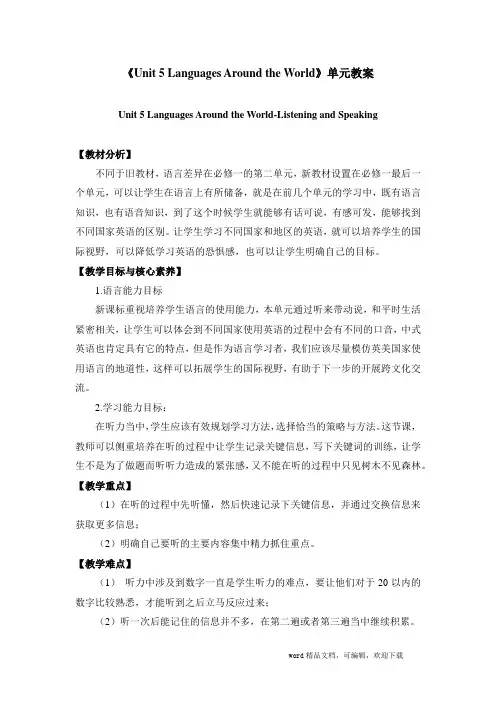
《Unit 5 Languages Around the World》单元教案Unit 5 Languages Around the World-Listening and Speaking【教材分析】不同于旧教材,语言差异在必修一的第二单元,新教材设置在必修一最后一个单元,可以让学生在语言上有所储备,就是在前几个单元的学习中,既有语言知识,也有语音知识,到了这个时候学生就能够有话可说,有感可发,能够找到不同国家英语的区别。
让学生学习不同国家和地区的英语,就可以培养学生的国际视野,可以降低学习英语的恐惧感,也可以让学生明确自己的目标。
【教学目标与核心素养】1.语言能力目标新课标重视培养学生语言的使用能力,本单元通过听来带动说,和平时生活紧密相关,让学生可以体会到不同国家使用英语的过程中会有不同的口音,中式英语也肯定具有它的特点,但是作为语言学习者,我们应该尽量模仿英美国家使用语言的地道性,这样可以拓展学生的国际视野,有助于下一步的开展跨文化交流。
2.学习能力目标:在听力当中,学生应该有效规划学习方法,选择恰当的策略与方法。
这节课,教师可以侧重培养在听的过程中让学生记录关键信息,写下关键词的训练,让学生不是为了做题而听听力造成的紧张感,又不能在听的过程中只见树木不见森林。
【教学重点】(1)在听的过程中先听懂,然后快速记录下关键信息,并通过交换信息来获取更多信息;(2)明确自己要听的主要内容集中精力抓住重点。
【教学难点】(1)听力中涉及到数字一直是学生听力的难点,要让他们对于20以内的数字比较熟悉,才能听到之后立马反应过来;(2)听一次后能记住的信息并不多,在第二遍或者第三遍当中继续积累。
【教学过程】Unit 5 Languages Around the World-Reading and Thinking【教材分析】本节课是高中英语第一册的最后一个单元的阅读和思考部分,文章难度明显增加,体现在以下几个方面:文章题材是说明文,比较难理解;话题生疏,涉及到历史等知识;生词量增大,而且在语境中理解词汇的要求提高。
Unit 5: The Chinese Writing System: Connecting the Past and the Present第1课时教学设计一、教学内容理解全文,了解汉字书写体系的发展。
第一课时以汉字的演变为核心,以“预测——提问——阅读——解惑——梳理——概括”为主要流程,整体感知文本内容,重点探究汉字文化体系的历史变迁(development)的主线。
教学从学生展示自己搜集的异形同义的汉字和辨认不同时期的“马”字导入,激活背景知识和主题词汇,再结合标题和插图,对课文内容等进行预测。
然后学生思考想要了解汉字书写体系的哪些方面,并通过阅读寻找答案,梳理、归纳、聚焦文本主要内容,形成并完善汉字书写体系的历史变迁的时间轴,推进信息的获取、梳理和归纳。
最后以介绍汉字书写体系发展整合输出语言。
二、课时目标1. 通过展示自己搜集的异形同义的汉字和辨认不同时期的汉字“马”,激活相关主题知识和词汇,并根据标题和图片预测文本内容,就汉字书写体系提出相关问题,激发阅读兴趣。
2. 运用寻读、梳理、归纳等策略,寻找“time & event”词块和信息,聚焦文本主要内容,关注汉字书写体系发展,积累相关主题语言,发展逻辑思维能力。
三、教学过程Activity 1: Talking about Chinese characters本活动为实现课时目标1而设计。
1. Show different Chinese characters of the same meaning in groups, and let others guess what those characters are and which periods they belong to.2. Identify characters of which period can be recognized easily and try to tell the reason.3. Look at the picture on page 62 and answer the following questions:Q1: Do you know this Chinese character?Q2: Can you recognize another “马” in the picture? Why?Q3: Where did people write down the symbols?Q4: How did people write down the symbols on animal shells?【设计意图】通过学生课前搜集的异形同义的汉字展示,谈论哪个时期的汉字能较为容易被认出来并说说理由,再结合课文插图中不同时期的汉字“马”的讨论,激活学生原有背景知识,引导学生关注汉字的发展与变化以及原因,引出相关话题词汇,如“picture-based”、“animal shell”、“symbol”、“carve”“Qin Dynasty”等,提高对历史文化变迁的敏感性,加深对中华文明的感知。
高一英语必修一第五单元教案精选5篇高一英语必修一第五单元教案【篇1】第一部分:热身快速应答:1.How are you going to school everyday?2.Thank you very much for your help.3.Would mind my opening the window?4.What day was it yesterday?5.What's the weather like today?第二部分:朗读口语朗读技巧:1.声调与降调I have three English books, two Chinese dictionaries and five pens. Do you havea map in your hand? Yes, I do.2.连读:将前一个单词最后的辅音与后一个单词开头的元音连在一起朗读。
half an hour ran out of not at all3.失爆:当相邻两个爆破音在一起时,往往给前面一个爆破音留一个位置,但不爆破,稍停随即发后面的爆破音,这种现象称为“失爆”。
hot bath the next day a good deal of I don’t believe I don’t know I want to say朗读练习:1. A smart housewife was told that there was a kind of stove which would only consume half of the coal she was burning. She was very excited, and said: That'll be terrific! Since one stove can save half of the coal, if I buy two, no coal will be needed!2.The little boy did not like the look of the barking dog.It's all right, said a gentleman, don't be afraid. Don't you know the proverb: Barking dogs don't bite?Ah, yes, answered the little boy. I know the proverb, but does the dog knowthe proverb, too?高一英语必修一第五单元教案【篇2】一、教材分析:本课是结合人教版高中英语教材选修5中有关过去分词的语法内容,进行过去分词的学习,教学中将语法知识的传授和语言基本技能的学习结合到一起,注重复习语法与语言的运用。
Unit 5 Nelson Mandela——a modern hero教材分析:本单元以Nelson Mandela —— a modern hero为话题,目的在于使学生了解一个伟大的人应具备怎样的品质,学会表达自己的观点,并用所学的句型来描写一个伟人。
提示:1、本单元从warm-up开始,到最后的writing,都是以第三人称的角度来进行描述的,因此,教学中要注意这种人称的前后一致,否则无法前后一致的引导学生进行学习和表达。
2、Reading部分侧重于理解,以及理解基础上的summary,这为最后的writing做好的铺垫和积累(尤其是关键单词、句型和结构的积累),最后的writing要是前面阅读后的仿写(当然能力较强的学生也可以不受限制的开展写作)。
3、如何激发学生学习关于这些伟人的文章,是需要教师思考的:这些伟人学生会感兴趣吗?学生了解多少关于这几位伟人的伟大业绩?从哪些角度来导入会让学生更加的感兴趣?4、教学目标建议增加:通过学习文章和相关素材,进一步了解伟人的生平事迹,尤其是如何才能成为伟人。
培养学生初步使用相关词汇、句型和文章结构进行人物生平描述的口语表达和基础写作能力。
Teaching aims:1. To arouse Ss’ interest in learning about heroes in history2. To develop Ss’ listening and speaking ability.Teaching procedures:Step1 warming up●Describe yourselvesFirst what kind of person are you? (shy, outgoing, fun, mean, immature, nice, kind, honest, brave, loyal, happy, wise, smart, friendly, warm, cheerful, popular, generous, hard-working, diligent, weak, stupid, lazy, dishonest, tense, cold, unkind, miserable, dull, strong-minded, determined etc.)●Discussion (Encourage students to give five or six qualities that they think greatpersons have, and give their reasons.)提示:What kind of great persons? Politicians, scientists, or? Different kinds of great persons, different qualities.Question 1: Who do you think are the greatest men in your mind? Can you name some?Question 2: In what way do you consider a man is a great? What is your standard?●Look at page 33 and then ask the Ss if these famous people are great people.●Conclusion:A great person is a person who has followed his or her ideas and sacrificed(牺牲) something so that they could be realized. A pop singer may be very popular with the young people, but he/she is not a great man/woman.A famous person may be well-known but if he or she has not gone through struggles and difficulties for their noble aims, they can not be called a great person.Step2 language points:1.devote vtoneself to 献身于、致力于。
新教材高一英语UNIT5教案一、电子教案:题目:Unit 5 Silver Screen 科目:英语授课老师:冯珍妮授课班级:高一(七)、(九)课时数:6(+1测验)教案相对应授课日期:XX年10 月25号——11月1号日期:10月24号电子教案设计老师:冯珍妮Teaching Plan for Unit 5 高一年级冯珍妮 1 .Teaching goals and Learning goals: Language skills: ①Talk about films, famous actors and directors ② Practise XXX comments and giving opinions ③Learn to write about a film Language knowledge: ①Vocabulary: silver screen,drama, play role, actress get married, grow up,degree, in the beginning, make money, live with sb。
,stepfather, director, make sb。
famous, short film,script studio,career,take off,blockbuster,creature, outer space, make friends with, adult,cut…into pieces, dinosaurs, go wrong, follow-up,cruelty, win over, owe…to…, moving, stay away,take… place, run after, escape, lock, afford, fail,on air, together with, not just…but also ②Patterns: *She went to New York, where she started working asan actress。
*She won her first Oscar as Best Actress。
*This film quickly made him famous。
*This was a film in which Spielberg used real actors instead of toys。
*Many people who saw the film were afraid to swim in the sea when they remembered the scenes in which people were eaten by the shark。
*He owes much of his success and happiness to his wife and children。
*The reason why he could not go there was that his grades were too low。
③grammar *关系副词when, where, why引导的定语从句。
关系副词when, where, why引导定语从句,在从句中分别作时间、地点或原因状语。
关系副词的意思相当于“介词+which结构”,其用法分类列类如下:关系副词被代替的先行词从句中的作用when(=at, in,on,during which)表示时间的名词时间状语where(=in,at which)表示地点的名词地点状语Why(=for which)只有reason原因状语*由介词+关系代词(who, that,which)引导的定语从句。
当关系代词whom或which在定词从句中用作介词宾语时,介词可放在whom或which之前,也可放在从句中原来的位置上。
即放在从句的动词之后;由不及物动词构成的短语动词一般不可拆开,必须连用,如关系代词省略,则介词必须与从句中的动词连用,不能拆开。
关系代词that作介词的宾语时,介词一定不可位于that之前。
④Useful spoken English *How do you feel about the story? *Steven Spielburg is one of the top directors in the film industry。
*Zhang Yimou’s film “Not One Less” tells a simple but moving story。
*After high school, Meryl went to study at a famous drama school。
*Speed quickly made Keanu Reeves famous。
2 .Teaching plan in sequence: Hour One warming up, listening and speaking (Homework: preview “reading” Hour Two Reading (Homework: Recite Par 1—2) Hour Three Reading (Homework: p110—111,grammer,p182) Hour Four Language study (Homework: P112(3) Hour Five Integrating skills (Homework: P112—113 integrating skills) Hour Six Work book, listening, talking,writing (Homework: Write about a film) Hour Seven Test Hour One Step One Warming up (12 minutes) Step Two Listening (13minutes) Step Three Speaking (15 minutes) Warming up Questions by teachers: (1)What can you see in Picture One? (On the beach, a girl and a strange man are carrying some pieces of wood, The man looks half human and half alien) (2)Do you know which movieis picture two from ? What is happening? (It’s from the movie called Jurassic。
The dinosaur has escaped from its cage and is hunting for food。
The men were scared greatly …) (3)Have you seen the movie produced by Disney company? Can you say something about Mulan?) (The story is from a Chinese historical story。
Mulan is a daughter of a general。
She goes to fight the enemy instead of her father。
She has to pretend to be a male soldier since women are forbidden to join the army。
) (4)Can you recognize the pretty actress? (Zhang Manyu is a well-known Hong Kong actress。
“Hero” is directed by Zhang Yimou。
It succeeds both in commerce and in movie art) Listening:Play the tape, play again when it is needed。
Help students understand the following expressions。
(1)interview (2)leading part (3)studio (4)Melbourne (5)How did that come about? (6)Dream Machine Ask Ss individually to fill in the blanks。
Teachers can go to P102 of the teacher’s book for help Speaking:Play the tape。
Ask Ss to read by themselves Ask Ss do role play in small groups: They can use the expressions in the box on Page 30。
if time permits,ask some of them to demonstrate Homework: vocabularyp 110—p 111 Hour Two Step One : Check the homework in class orally Step Two: Pre-reading Questions by teachers (1)What kind of movie will you make? (fiction film,fantasy film,animation film,historical film) (2)Which one would you like to become? An actor/actress, producer or director? (3)If you are a director what actors/actress will you choose? (Ask them to use imagination) Step Three:(1)Play the tape and Ss books closed (2)Ss read the material freely (3)Ss look for the general information for each paragraph with the help of the teacher The general idea for each paragraph:Paragraph 1:yearsEvents1946Spielberg was born in a small town1958He made his first real film with real actors 1959He won a prize for a short film1962He made film called Fire lightParagraph 2: He couldn’t go to the film Academy because of his low grades。